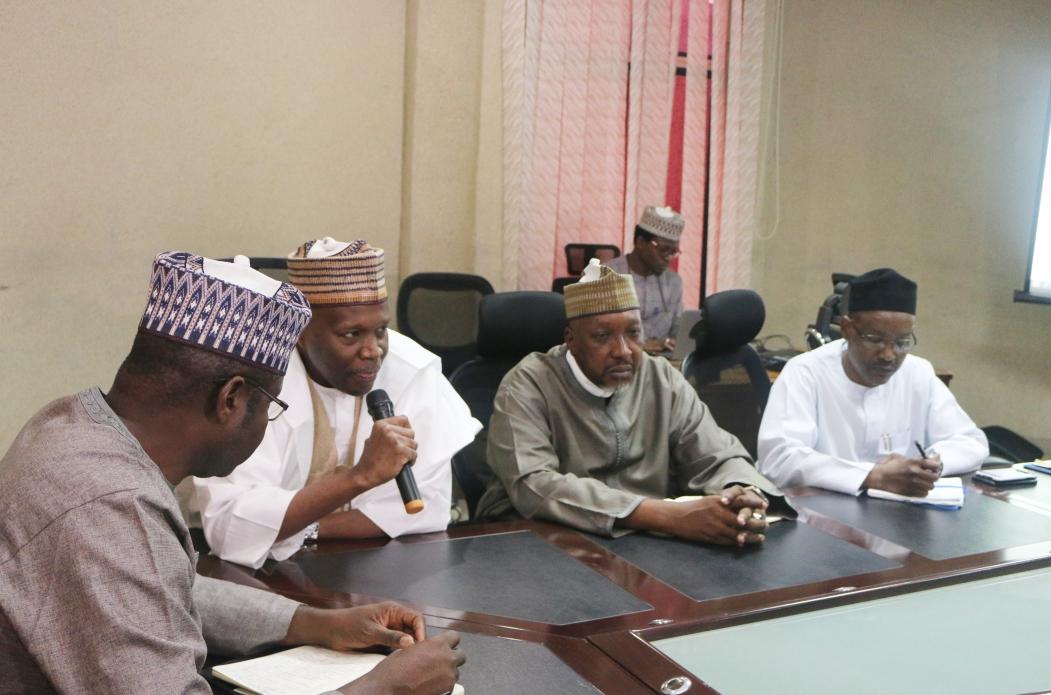
21 minute read
Power Generating Plants in Nigeria are now Frequency Responsive - Mohammed
GOMBE STATE GOVERNMENT
READY TO PARTNER WITH TCN TO IMPROVE BULK POWER SUPPLY
Advertisement
(L-R), MD/CEO TCN, Mr Usman Gur Mohammed, Gombe State Governor, Alhaji Muhammadu Yahaya with his delegates during the meeting
The Gombe State government said it is ready to partner with the Transmission
Company of Nigeria (TCN) to improve bulk power supply in the state in order to enhance the socioeconomic activities of its people.
T h e S t a t e G o v e r n o r , A l h a j i Muhammadu Inuwa Yahaya, made the pledge when he led a delegation to TCN on a courtesy visit on Friday, 23rd August 2019, at the TCN headquarters, Abuja.
The Governor said the visit became i m p e r a t i v e t o s e e k T C N ' s collaboration to improve power supply situation in the state, and the entire North East zone of the country in general.
He lamented that since after privatization of the power sector in 2012, no meaningful effort has been made to improve the power distribution situation in Gombe state. He noted that the state, in its quest for more quality and stable power supply for its people, had invested hugely as counterpart funding in a National Integrated Power Project (NIPP), under the Niger Delta Power Holding Company (NDPHC).
He appealed to TCN to assist the state by building more substations and transmission lines in order to enhance bulk quality and stable electricity supply. This, he noted, would help lift his people out of the several challenges associated with poor power supply.
Responding, the MD/CEO of TCN, Mr. Usman Gur Mohammed stated that TCN has adequate transmission capacity in Gombe State.
Mr. Mohammed also stated that under the West African Power Pool (WAPP) Eastern Backbone Project, a new transmission line will be constructed from Calabar to Kano which would also help improve bulk power in the North East, as well as adding another source of bulk power supply to that axis.
According to him, poor access to electricity was responsible for the deplorable situation in the North Eastern part of the country; he assured the governor that TCN was doing everything possible to i m p r o v e t r a n s m i s s i o n infrastructure in Gombe and across the entire country.
He noted that the installed c a p a c i t y o n 1 3 2 / 3 3 k V transmission substation at Gombe, will increase when the ongoing 2x60MVA, 132/33kV substation at Billiri in Gombe State is completed. The project was initially delayed by the previous contractor but the nonp e r f o r m i n g c o n t r a c t w a s terminated and therefore arrangement has been put in place to complete the project. He said this would boost the poor supply associated with long distance 33kV lines in the
By Eric Ene Ephraim
GOVERNOR SIMON LALONG COMMEND TCN'S EFFORTS AT TRANSMISSION EXPANSION IN THE STATE
By Stella Ejikonye
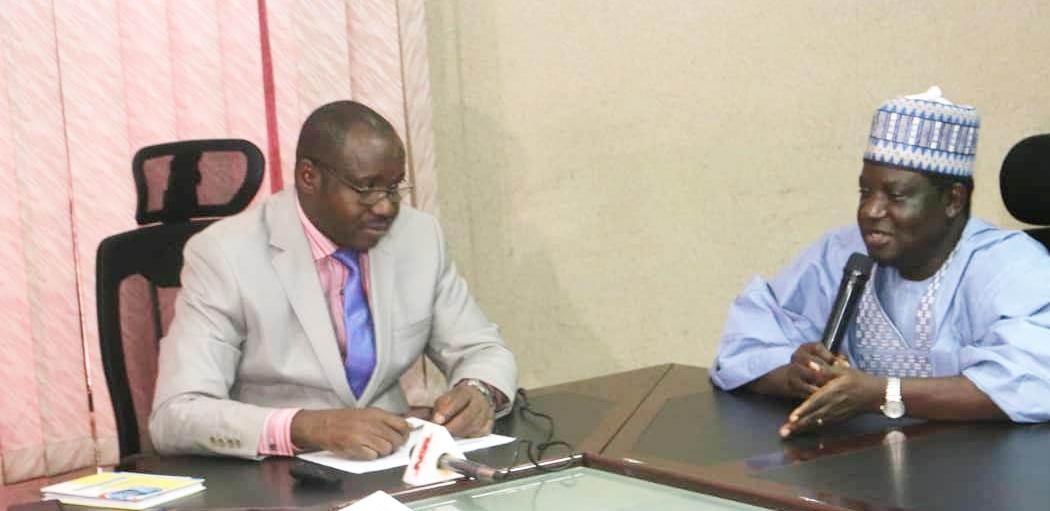
The Executive Governor of Plateau State, Simon Lalong has commended TCN for improved bulk electricity supply and
promised partnering with it to further improve transmission infrastructures in the state.
Mr Lalong made this known recently, when he paid a courtesy visit to TCN to discuss ways of further improving power supply in Plateau state. Expressing gratitude for the first-hand information by the MD/CEO on concrete plans to improve bulk power supply, the governor assured of his earnest support in making TCN's work easier and successful in the state.
Earlier, the MD/CEO of TCN, Mr. Usman Gur Mohammed had urged the governor to key into partnership with TCN as other state governors have done, noting that such collaboration leads to faster completion of transmission projects.
Mr. Mohammed however applauded the governor for recent efforts in resolving challenges that helped TCN complete the installation of the Markudi-Jos transmission line. He said that TCN will extend the line to parts of Southern Plateau up to Langtan and Wase, noting that TCN was equally considering the closure of the loop up to Bauchi, so that the line can receive supply through Bauchi and Jos.
He further informed the Governor and his team that TCN, under its Transmission Rehabilitation and Expansion Program (TREP), was working assiduously to boost power supply across the country, including Plateau State. He assured the Governor that another transmission line would be constructed in addition to the existing one to boost and stabilize electricity supply in Jos and environs. He also assured the Governor that an additional 1x150MVA power transformer would be installed in Jos to augment the already existing one in Jos Substation. This, he said, would provide the necessary redundancy in the area.
The MD/CEO disclosed that TCN would soon complete the second line between Jos and Kaduna so that Jos can also receive sufficient supply through Kaduna as well as Jos-Makurdi. TCN has equally commenced the installation of three more reactors to improve voltage stability in that axis.

MD/CEO TCN, Mr. Usman Gur Mohammed and Ebonyi state governor, Mr David Umahi
EBONYI STATE GOVERNMENT SEEKS MORE PARTNERSHIP WITH TCN ON BULK POWER DELIVERY
bonyi State government Ehas sought for more partnership with the
Transmission Company of Nigeria (TCN) in delivering bulk power under the Eligible Customer policy, to boost socioeconomic activities in the state.
The state governor, Mr David Umahi made this known when he paid a courtesy visit on the M a n a g i n g D i r e c t o r / C h i e f Executive Officer, TCN, Mr Usman Gur Mohammed on Thursday, 4th July, 2019 at the Corporate Headquarters in Abuja. He said with the rising number of industries in the s t a t e , e l e c t r i c i t y w a s fundamental to development and job creation.
Mr Umahi who commended TCN on the Eligible Customer Policy, gave assurance that his administration was ready to take the necessary steps in getting steady and quality power supply to Ebonyi. He also stated that he would be delighted if on-going TCN projects like the Substation at Amasiri would be completed within a realistic timeline, adding that his administration was willing to provide every assistance necessary.

He further explained that the state government would soon s i g n t w o a d d i t i o n a l Memorandum of Understanding (MoU), which he called the International Market, stating that it had been evaluated and very viable. According to him, a new government house is currently under construction, with some other structures near c o m p l e t i o n i n c l u d i n g a Secretariat, Teaching Hospital, Ecumenical Centre, School of Nursing, Industrial clusters hosting battery factory, solar power plant and an Indomie factory, among others. These, he noted, require the availability of steady power.
In his response, the MD/CEO, TCN, U. G Mohammed who lauded the efforts of the governor, assured him of TCN's willingness to partner with the state. He noted that significant investment is being made in the transmission network with funding from multilateral donor agencies to the sum of USD1.661 billion dollars under the Transmission Rehabilitation and Expansion Programme (TREP), in order to expand the grid.
The MD recommended the Eligible Customer to the governor as a more viable option for having a regular and constant supply of electricity to power the various large projects undertaken by the state. According to him, the primary o b j e c t i v e o f t h e E l i g i b l e Customer was to create a direct link between the electricity customer and Gencos without the involvement of the electricity distribution companies (Discos), whom he said needed significant investment in their network.
Mr Gur also expressed optimism towards on-going projects in the s t a t e a n d d i r e c t e d T C N engineers to look into the Amasiri Substation and get the contractor back on site for timely delivery.
By Gabriel N. Gandu
MD/CEO Mr U.G. Mohammed (Left) at a panel discussion at 37th Nextier Power Dialogue in Abuja
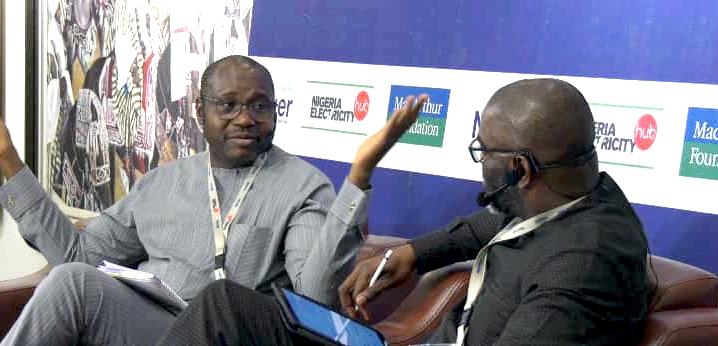
Th e M a n a g Transmission Nigeria (TCN) e m e n t o f Company of has disclosed
that all the power generating plants in Nigeria are now frequency responsive and that has enabled the sector attain Frequency Control of 4 9 . 8 a n d 5 0 . 2 h e r t z i n t h e transmission network.
The Managing Director and Chief Executive Officer of TCN, Mr. Usman Gur Mohammed made this disclosure while speaking as a discussant at the 37th Nextier Power Dialogue with the theme “Evaluating Transmission Link for a Competitive Electricity Market”, recently in Abuja.
Mr. Mohammed noted that the achievement of frequency control has gone a long way to stabilize the grid network and improve the quality of
power.
He further stated that TCN has procured 260MW spinning reserve, to further stabilize the grid and reduce system collapse. M o h a m m e d w h o d e s c r i b e d transmission as the bridge in the electricity value chain in the country, said that efforts to stabilize the grid is an ongoing one as TCN continues to d i l i g e n t l y i m p l e m e n t t h e Transmission Rehabilitation and
Expansion Programme (TREP).
One of the discussants at the event
and former Chairman, Nigerian Electricity Regulatory Commission, NERC, Dr. Sam Amadi stated that building the capacity of the power sector ought to have been first carried out before privatization.
According to him, all aspects of the power value chain were underdeveloped before the reform, with limitations in terms of covering critical places in TCN network, constraints from NERC giving license, and ease of evacuation of power, as well as other basic frailties which he stated still exist even after
reformation took place in the power sector. He stressed that most of the
problems today, ranging from communication backbone for fiber
optic, frequency of outages and system collapses are still traceable to those frailties that were not taken
care of before privatization.
On tariff, Mr. Amadi advised that tariff should be reviewed as at when
due, adding that the problem of the Discos isn't tariff, but lack of financial capacity.
Key recommendations and action points from the forum included the need to run a competitive private e l e c t r i c i t y m a r k e t b y commercializing power transactions between Gencos, Transmission and Discos, Re-capitalisation of the Discos, practicing a System Operation that is fair and a bankable
management of power dispatch, and the need for Nigerian Electricity Regulatory Commission (NERC) to p e r f o r m r e g u l a t i o n i m p a c t assessments periodically to review and evaluate the efficiency of preset policies. It was noted that the Nigerian electricity market is still very much in its early stages, and would transform gradually before it stabilises.
By Osuagwu Uloma
TCN EXECUTES MORE DONOR FUNDED TRANSMISSION PROJECTS
…seeks NERC's intervention to recover N270bn debts from Discos
MD/CEO, Mr U.G. Muhammed (Standing) addressing Donor Agencies at the meeting in Abuja.

Th e T r a n s m i s s i o n Company of Nigeria (TCN) has said that huge power transmission projects are being executed nationwide with $1.661 billion funds obtained from multilateral donor agencies to improve bulk power delivery in the country.
The Managing Director and Chief Executive Officer of TCN, Mr Usman Gur Mohammed who made this known during TCN and donor coordination meeting

on Friday, th27 September 2019, in Abuja, said the meeting was to enable TCN brief the donors about the progress made with the funds it has so far received for the e x e c u t i o n o f v a r i o u s transmission projects in the country. According to him, TCN was making tremendous progress in strengthening and expanding the grid system. He added that part of the TCN startegies is improving inhouse engineering capacity to handle projects. "We have installed 67 power transformers using inhouse method of taking over projects and completing them and also helping contractors to finish their projects" He further explained that TCN recovered 775 stranded equipment containers out of the 800 units that were left in Nigeria ports for years. Transformers installed from the recovered equipment containers by TCN engineers have upped TCN wheeling capacity from 5500MW in 2016 to 8,100 megawatts (MW) by December 2018. TCN according to him, would equally re-conductor major power transmission lines that will increase the bulk power delivery capacity by another 3,000 megawatts. S o m e o f t h e l i n e s t o b e reconductored, he stated, included the lines between Birnin Kebbi and Sokoto; Itu and Aba, as well as key transmission lines in Lagos. Mr Mohammed who reiterated TCN's commitment of working towards self-sustainability in its operations to earn more revenue and invest more in expanding the transmission network, used the occasion to seek the Nigerian E l e c t r i c i t y R e g u l a t o r y C o m m i s s i o n ( N E R C ) intervention to recover N270bn indebtedness owed it by 11 e l e c t r i c i t y d i s t r i b u t i o n c o m p a n i e s f o r e l e c t r i c i t y transmission services it rendered to them.
By Eric Ephraim Ene
According to him, the debts, if paid would enable it to offset part of the $1.661 billion worth of loan it secured from multilateral agencies such as the World Bank, and African Development Bank (AfDB), French Development Agency (AFD) amongst others, to upgrade the national grid.
"The Discos owe TCN N270 billion cumulatively as debts. We can finance our operation and so all the loans we have been taking, we are now signing agreements with the Federal Ministry of Finance that TCN will pay the loans" said Mohammed.
He however decried the lack of investments at the DisCos’ network saying they need 4.3 billion dollars to match the investments in transmission network. He said the DisCos can become viable when they are recapitalised with the appropriate funding.
In his remarks at the occasion, the Permanent Secretary in the Federal Ministry of Power, Mr Louis Edozien said the meeting was an opportunity for TCN to b r i e f t h e d o n o r s o n t h e transmission projects it is executing with the fund.
Mr. Edozien who was represented by the Director of Transmission in the ministry, Engr. Emmanuel Nosike, said; "Before now, the transmission network has not been a s i t i s , b u t t h e c u r r e n t management came up and has been doing all that you are seeing today"
The Director General of the Bureau of Public Enterprises (BPE), Mr Alex Okoh lauded TCN for exploring creative means of raising the needed capital to invest in the critical segment of the power value chain. He bemoaned the difficult challenges that face the Nigeria power sector and appealed to all stakeholders to approach issues in a more coordinated and harmonised manner with the aim of solving the problems.
An Energy Specialist from the World Bank which is one of the donors, Mr Mohammed Wakil, was optimistic that TCN would deliver on the projects. He however appealed for synergy amongst all value chain operators
The meeting was attended by representatives from World Bank, African Development Bank, (AfDB), AFD, JICA, Office of the Vice President, Federal Ministry of Power, BPE and others development partners.

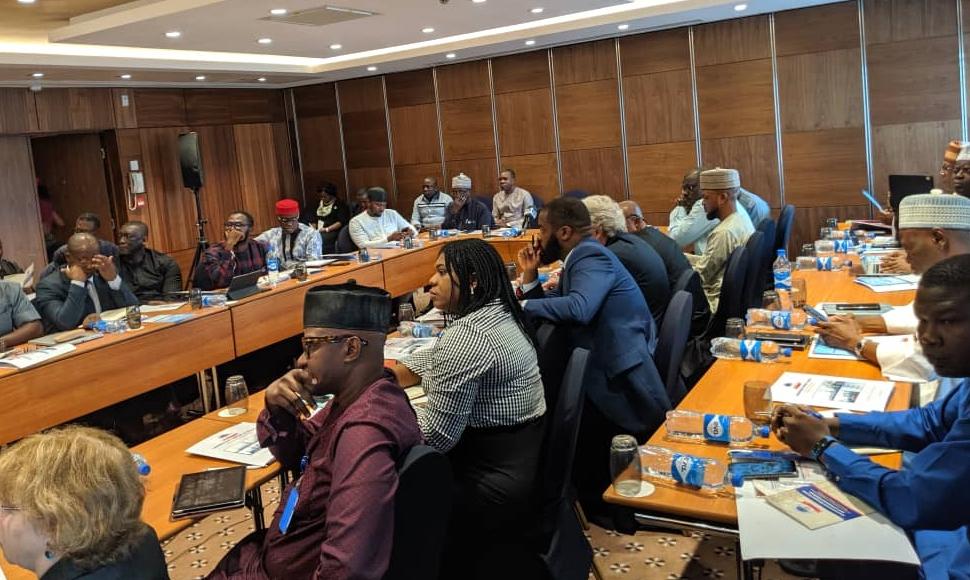
A cross section of Donor Agencies at the meeting in Abuja
INTERVIEW
Enforcement of Nigeria Electricity Market Rules will benefit all Stakeholders - U G Mohammed
MD/CEO TCN, Mr. Usman Gur Mohammed The Managing Director/CEO of Transmission Company of Nigeria (TCN), Mr. Usman Gur Mohammed in this interview, at the sideline of West African Power Pool (WAPP) synchronization of power system meeting held recently in Abuja, said that the Nigerian Electricity Market can only be sustained with enforcement of Market Rules, stressing that there's no business or sustainable investment without rules. Excerpts:
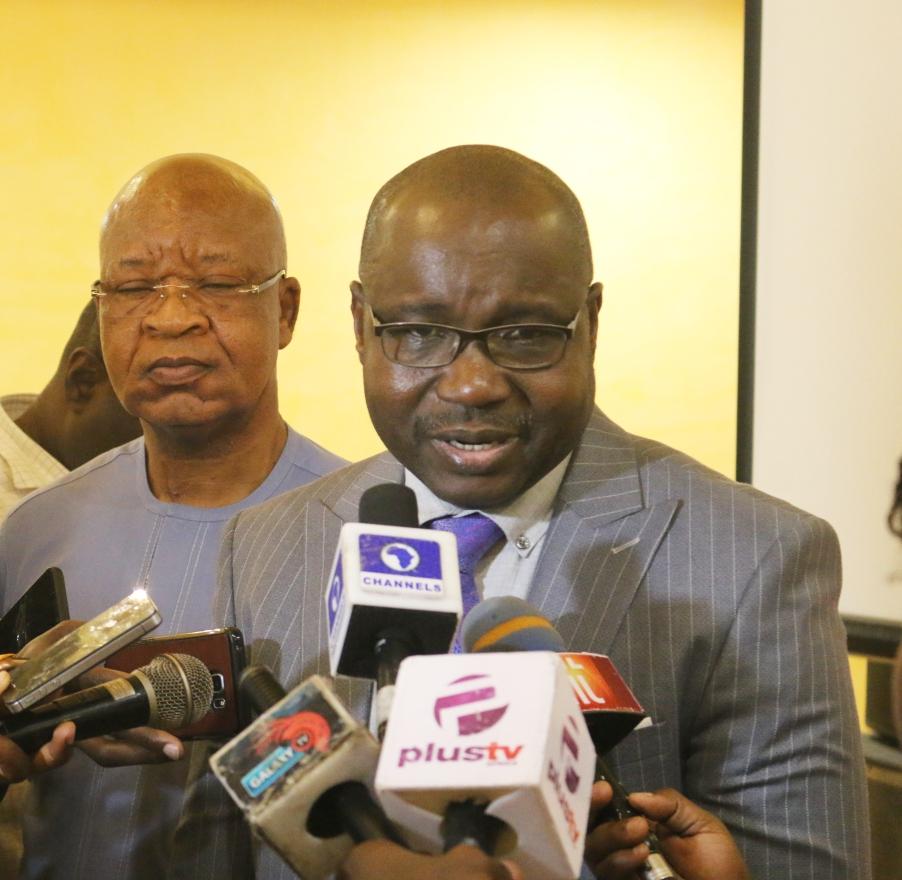
Q u e s t i o n : W h a t i s t h e s i g n i f i c a n c e o f t h e W A P P synchronization meeting?
Last year we had this kind of meeting where we brought all the utilities in West Africa especially the generators and the transmission companies to tackle the issue of frequency control. This time around, we are doing the same thing but in a different form, we are specifically looking at the generators. So WAPP has recruited General Electric (GE) to look at Free Governor Mechanism in power Generators in West Africa.
This workshop is to sensitize power generators to co-operate with GE, so that we set the generators on free governor mode, in a way that will make it easier to synchronize the three Islands across West Africa. Currently nine (9) Countries are interconnected in West Africa, the remaining five (5) countries will be connected when we complete the transmission lines from Cote d'ivoire to Sierra Leone, to Liberia and Guinea. The other line will connect Senegal to Guinea Bissau, to Mali. These lines will be completed by next year, by then, the 14 countries will have been connected. But for power to flow from Nigeria to Senegal and from Senegal to Nigeria, we have to synchronize t h e s y s t e m s a n d t h e synchronization process is what we are doing now.
Question: MD, you talked about the need for a cost reflective tariff and subsidy for the synchronization and the power market in WAPP to become effective, what does that mean and what does it entail?
Last year the Committee of Heads of States approved the 2 0 1 8 G e n e r a t i o n a n d Transmission Master plan for West Africa, which was done by a consultant, Mr. Tractebel. Now t h a t g e n e r a t i o n a n d transmission master plan is supposed to open up West Africa by building a 330kV line and substations from Nigeria up to Senegal, and will also enable the connection between North Africa, West Africa and Central Africa. It also approved that all the Utilities in West Africa should have a course reflective tariff, this means they should have their revenue requirment, but tied to that is the fact that there are countries in West Africa that believe that they cannot allow cost reflective tariff to be charged. In this case, they should budget for the difference in a transparent manner. Also all utilities in West Africa should adopt competitive procurement of their services and equipments to engender a sustainable electricity market. Definitely, the market has to pay for the service that its providing.
You will agree with me that it will be difficult for Countries to budget for the entire fund required to provide electricity for the whole of West Africa, without involving the private sector, so the objective is that if you have cost reflective tariff, it will be easier for private sector participation. As at now, the only country that has fully
liberalised its electricity market is Nigeria, so for us to encourage the other countries to fully liberalise their market, they need to have cost reflective tariff, thats the reason why it was stated in the three directives that was issued to the ECOWAS Committee of Heads of States and Government which was approved on 22nd December 2018.
Question: Do you think there is need for more laws for the power sector to work better?
I dont think there's any thing wrong with our laws. If there's any problem, I think its with implementation. The problem is with implementation and we are working to resolve the problem with the implementation. You will agree with me that before, transmission used to be the weakest link in the power supply value chain. Today, transmission is not the weakest link, we have several completed and on going projects, and have plans to put N-1 across the country as well as resolve all problems that will make the grid a modern grid.
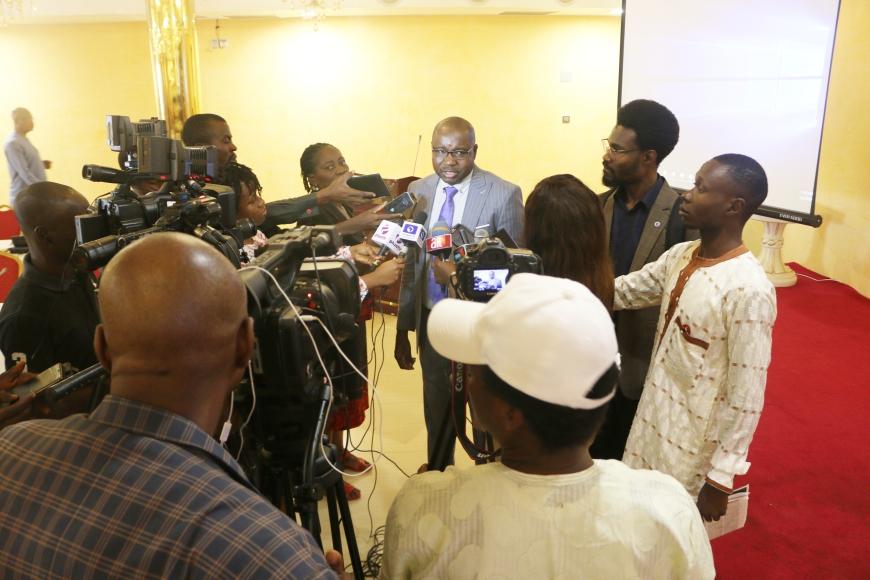
N o w , a s w e a r e f i x i n g transmission, efforts should also be made to ensure that we fix distribution, which is now the biggest challenge in the sector. Looking at generation, I don't think generation is a problem in Nigeria. Yes, we have issues of gas which will be solved once the liquidity problem in the power sector is resolved. The main problem is on the implementation, and this Government is doing everything to ensure that in i m p l e m e n t a t i o n , a l l p a s t mistakes, and the issues that we had are corrected.
Question: Is the market operator of TCN playing the regulator's role by enforcing discipline in the electricity market?
You know NERC is a regulator, isn't it? And am sure NERC has not complained that what we are doing is wrong. You can see clearly what we are doing, when you say we are enforcing Market Rules, it means that they are very enforceable. Is there any way you c a n h a v e a s u s t a i n a b l e investment without rules? There's no way, you have to have rules and it has to be obeyed. So,
the Market Rules explain how the market is to be governed, and inside TCN, you have what is c a l l e d t h e M A R K E T OPERATOR. Market Operator is in charge of the operation and functioning of the market, and if the Market Operator cannot enforce the rules and ensure that everybody plays according to the rules, there is no way we can have a sustainable market. Efforts are being made to ensure that market participants play by the rules and that the market becomes sustainable.
Of course, clearly, we are empowered by law, if not, they would have taken us to court. In reality, for the Market to function properly and be able to attract investment, people need to do the right thing. For your information, the Market Rule is one of the ruling documents governing the power sector. Others are the EPSR Act of 2005 and the grid code and you have to enforce them all, they work together and there is no conflict between the market rule, the grid code and the act. So, we enforce the Market Rule according to how it's supposed
to be enforced and I believe that with the enforcement, we will soon see so many benefits because there are things people have taken for granted in the past, which will stop. Also, they will stop doing things discretionally because they would have to play according to the rule.
NERC is a regulator, and nobody will work in the sector without NERC. Let me give you an example, in the market rule section 74 and sub section A and D states that if the m a r k e t o p e r a t o r h a s
MD/CEO, TCN Mr U.G Mohammed addressing pressmen after the WAPP meeting in Abuja.



